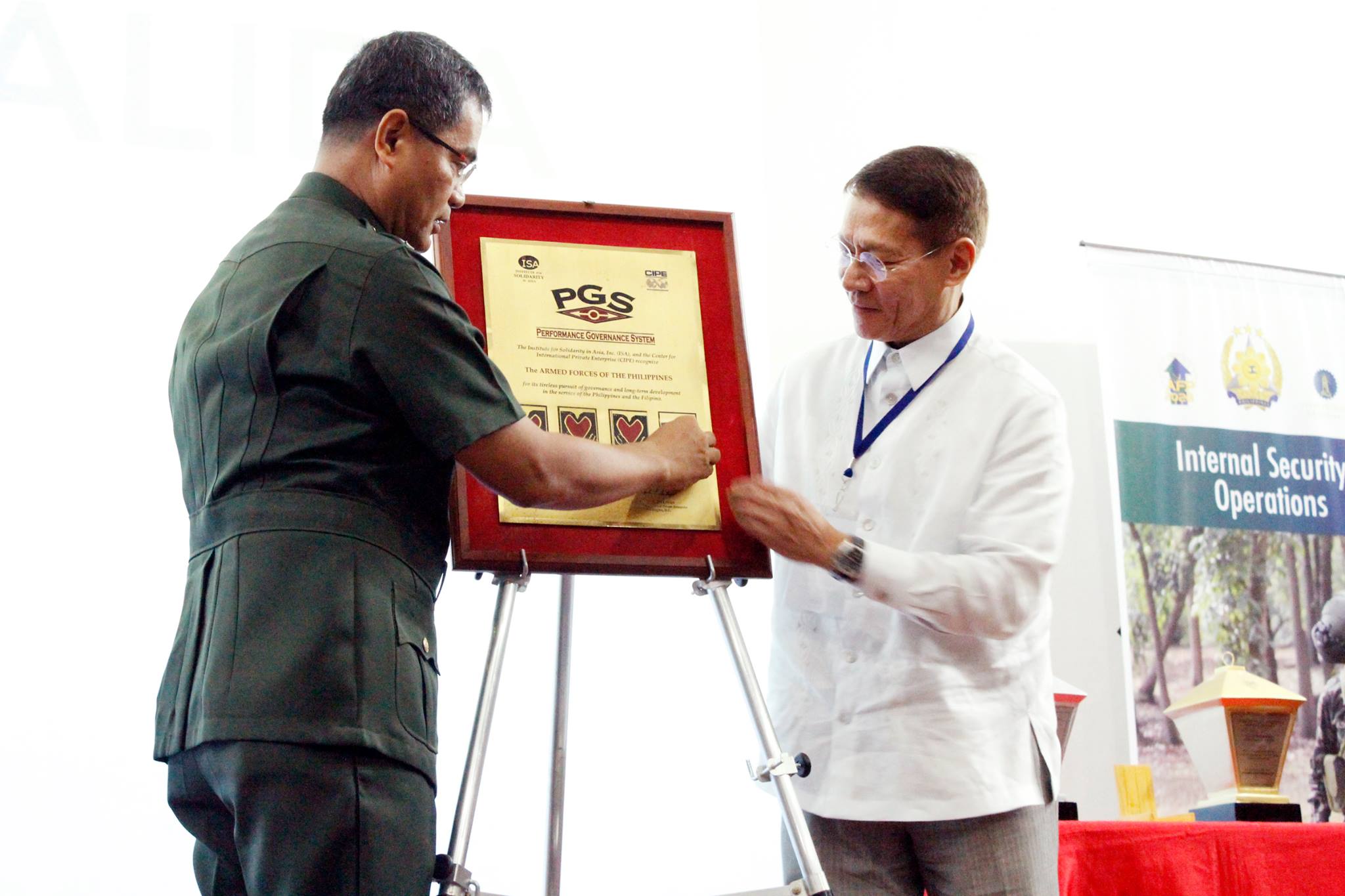[fusion_builder_container hundred_percent=”yes” overflow=”visible”][fusion_builder_row][fusion_builder_column type=”1_1″ layout=”1_1″ background_position=”left top” background_color=”” border_size=”” border_color=”” border_style=”solid” spacing=”yes” background_image=”” background_repeat=”no-repeat” padding=”” margin_top=”0px” margin_bottom=”0px” class=”” id=”” animation_type=”” animation_speed=”0.3″ animation_direction=”left” hide_on_mobile=”no” center_content=”no” min_height=”none” last=”no” hover_type=”none” link=”” border_position=”all”][fusion_text]
On November 29, 2016, the Armed Forces of the Philippines (AFP) underwent a public revalida for Institutionalization under the Institute for Solidarity in Asia’s (ISA) Public Governance System (PGS). Institutionalization is the fourth and final stage of the governance reform program.
Presenting in the Manipula Hall, AFP Command General and Staff College, Camp General Emilio Aguinaldo, which was filled with officers and civilian personnel as well as members of business and civil society, AFP’s Inspector General MGEN OSCAR T LACTAO AFP showcased the progress of the organization in its AFP Transformation Roadmap 2028 (AFPTR). He likewise responded to questions from the multi-sector panel invited to critique and offer suggestions to the organization based on its members’ wealth of knowledge and experience in governance, military, and social issues.
Guided by the vision of becoming a world-class Armed Forces and a source of national pride by 2028, the organization in coordination with its three major services (the Philippine Army, Philippine Navy, and Philippine Air Force) strives to protect the Filipino people from any threats (or the sovereignty of the state from any threats). The AFPTR is divided into three base camps or milestone years that are reflective of its progress as a more responsive AFP. The first base camp set for 2016 focuses on developing a “Mission Capable AFP” for three mission areas: internal security operations, human assistance and disaster response, and territorial defense.
Though internal security matters fall under the jurisdiction of the local government units and the Philippine National Police, AFP has been actively involved in working to establish peace in the different regions through its IPSP: Bayanihan initiative.
In the public revalida, panelist John D. Forbes of the American Chamber of Commerce asked whether the AFP was prepared to deal with the challenge of terrorist groups within the country. Lactao responded by saying, “We are a nation in progress. There are still areas in our country where people consider themselves as part of the community but not part of the nation. Terrorist groups are a symptom of that. The AFP is working to stabilize the situation without uprooting the lives of the people in the surrounding areas.” With 71 out of their targeted 76 provinces for 2016 declared peaceful and ready for further development, the AFP can now concentrate on its primary mandate.
In recent years, the AFP has clearly played a major role not just in keeping the country safe from external threats, but also in its participation in developmental activities such as building schools, infrastructure, and more. One area where their presence has been felt the most is in humanitarian assistance and disaster response (HADR) during natural calamities such as typhoons and earthquakes. In determining what would keep the organization relevant to the security of the people, the AFP identified strengthening its HADR capabilities to serve people better.
When asked about their biggest challenges moving forward, the AFP cited sustainability and leadership stability. With leadership changing on almost a yearly basis, sustainability of plans and programs is a big concern. However, AFP is confident that with thorough cascading down to the individual level, continuity will be less of an issue.
In his closing remarks, ISA CEO Alexander Lacson congratulated the AFP for successfully completing the Governance Pathway, but also reminded them that the challenges won’t end here. He said, “With a role as critical as AFP’s, trust is essential. Its institutionalization is a sign that the organization’s transformation will not stop. The country will evolve and the AFP will evolve with it. New challenges may arise along the way, but the AFPTR will help the military stay true to its path of good governance.”
Learn more about the AFP Transformation Roadmap by visiting https://www.facebook.com/AFPTR2028.
[/fusion_text][/fusion_builder_column][/fusion_builder_row][/fusion_builder_container]

